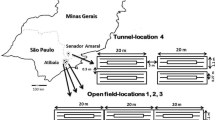Abstract.
Three concentrations of Pasteuria spores applied to soil and some agricultural practices were evaluated for their effects on spore attachment to nematodes and biocontrol of Meloidogyne incognita on tomato in a microplot experiment. Applications of Pasteuria at concentrations of 5×1010 spores/m2 increased tomato fruit yield per plant by 46% compared to non-Pasteuria treatments but also increased nematode densities in soil at harvest time. M. incognita juveniles recovered from plots where Pasteuria was applied at 5×1010 spores/m2 showed greater spore attachment than those with application rates of 2.5×109 spores/m2 or 5×109 spores/m2. Pasteuria spores penetrated to 30–40 cm soil depth in a volcanic ash sandy soil after application of spore suspensions to the soil surface. Densities of over 2.5×104 spores/g of soil were reached at 0–30 cm soil depth only when the application rate was 5×1010 spores/m2, but at harvest and after fallow densities of about 2.5×104 spores/g of soil were also reached in the top 10 cm of soil at 2.5×109 and 5×109 spores/m2 application rates. Spore densities in soil decreased after 6 months of fallow when densities at harvest time were higher than 105 spores/g of soil. Tillage and additional watering 2 days after spore application increased spore densities in soil at harvest throughout the soil depth (0–40 cm).
Similar content being viewed by others
Author information
Authors and Affiliations
Additional information
Electronic Publication
Rights and permissions
About this article
Cite this article
Talavera, M., Mizukubo, T., Ito, K. et al. Effect of spore inoculum and agricultural practices on the vertical distribution of the biocontrol plant-growth-promoting bacterium Pasteuria penetrans and growth of Meloidogyne incognita-infected tomato. Biol Fertil Soils 35, 435–440 (2002). https://doi.org/10.1007/s00374-002-0491-3
Received:
Accepted:
Issue Date:
DOI: https://doi.org/10.1007/s00374-002-0491-3




